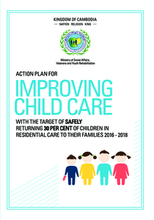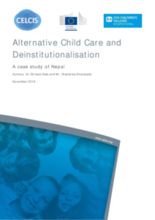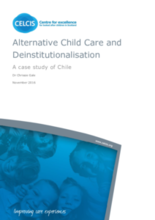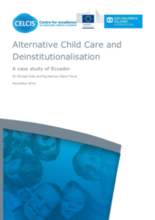Displaying 441 - 450 of 917
This Action Plan for improving child care, with the target of safely returning 30 per cent of children in residential care to their families 2016 - 2018, was developed to support the implementation of the Ministry of Social Affairs, Veterans and Youth Rehabilitation (MoSVY) Work Platform 2014–2018 and the Sub-Decree 119 on the Management of Residential Care Institutions, which was endorsed on 11 September 2015.
This paper draws on the literature and practice examples from around the world to examine the fundamental challenges experienced by States in their efforts to implement the 'suitability principle,' as described in the Guidelines for the Alternative Care for Children.
The report investigates why children are placed into alternative care, what types of alternative care are available in Nepal, what structures and processes govern alternative care, how the alternative care workforce are trained and supported, and what is and is not working in Nepal's current system. It concludes with recommendations for enhancing alternative care in the country.
The European Commission Directorate-General for Justice and Consumers commissioned SOS Children’s Villages International to undertake case studies of arrangements for ‘alternative child care’ in six non-European countries in three continents to help inform the EU’s future strategy for provision of support for children in countries outside Europe. This report is a case study of one of the six countries, Chile.
This paper is an attempt at rethinking the systemic problems facing the funding and commissioning of care services and placements for children in need of care and adoption, across ALL types and specialisms of placement, from kinship care, through foster care, to residential care and adoption.
The European Commission Directorate-General for International Cooperation and Development (DG DEVCO) commissioned SOS Children’s Villages International to undertake case studies of arrangements for ‘alternative child care’ in six non-European countries across three continents to help inform the EU’s future strategy for provision of support for children in countries outside Europe. This report is a case study of one of the six countries, Ecuador.
The overall purpose of this study is to present an ‘introduction’ to alternative care systems in Central and South America (CSA).
In this video from United Aid for Azerbaijan, several experts and public officials discuss the importance of deinstitutionalization.
This brief explores challenges and strategies for evaluating systems and organizational change in US child welfare settings.
The current study makes analyses of the national strategy for deinstitutionalization of children and concludes on important recommendations concerning national policy development.







